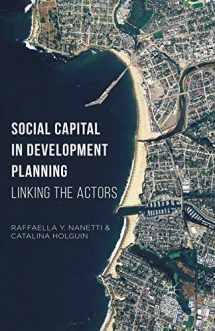
Social Capital in Development Planning: Linking the Actors
Book details
Summary
Description
The pursuit of sustainable development and smart growth is a main challenge today in countries around the world. Social capital is an asset of their territorial communities. It is also a precondition for national and local policies that aim to better the economic base and quality of life for all. This change is socially diffused, economically sustainable over time, and smart in its content. A significant stock of social capital facilitates such results because it links into the process of development planning institutional decision makers and socioeconomic stakeholders who share trust, solidarity norms, and a community vision.
In the last thirty years, social capital has become a forceful concept in the social sciences, the subject of many scholarly works and a topic of keen interest and debate in policy circles. Yet the main focus has been on defining and measuring social capital, with little attention given to its value in promoting development policies. Social Capital in Development Planning updates and advances the debate on social capital through the analysis of the application of the concept of social capital to programs for sustainable and smart socioeconomic development; empirical findings; and a new paradigm for development planning.


We would LOVE it if you could help us and other readers by reviewing the book
Book review



